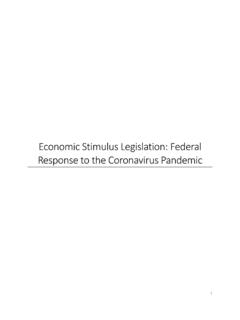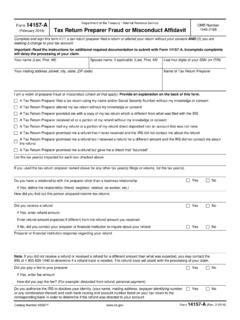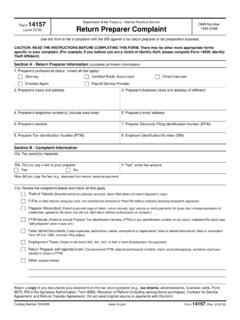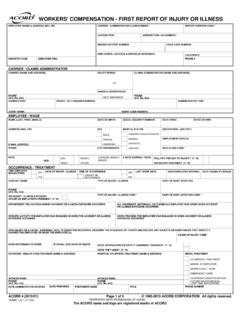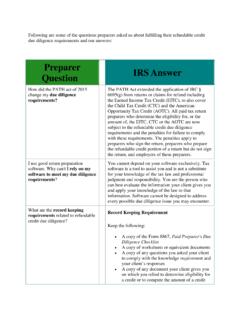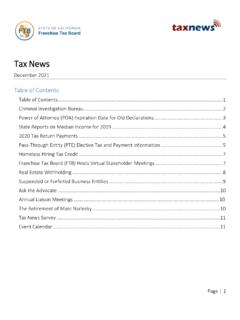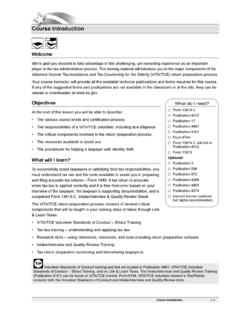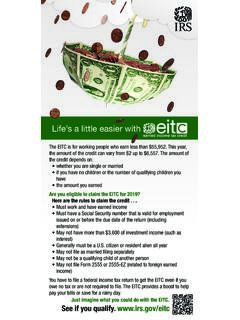Transcription of EITC Due Diligence
1 I EITC Due Diligence ii Copyright 2015 - 2021 by 1040 Education LLC ALL RIGHTS RESERVED. NO PART OF THIS COURSE MAY BE REPRODUCED IN ANY FORM OR BY ANY MEANS WITHOUT THE WRITTEN PERMISSION OF THE COPYRIGHT HOLDER. All materials relating to this course are copyrighted by 1040 Education LLC. Purchase of a course includes a license for one person to use the course materials. Absent specific written permission from the copyright holder, it is not permissible to distribute files containing course materials or printed versions of course materials to individuals who have not purchased the course.
2 It is also not permissible to make the course materials available to others over a computer network, Intranet, Internet, or any other storage, transmittal, or retrieval system. This document is designed to provide general information and is not a substitute for professional advice in specific situations. It is not intended to be, and should not be construed as, legal or accounting advice which should be provided only by professional advisers. iii Contents Introduction to the Course .. 1 Learning Objectives .. 1 Chapter 1 Earned Income Credit Rules .. 2 Introduction.
3 2 Learning Objectives .. 2 Nature of the Earned Income Credit .. 2 Earned Income Credit Eligibility .. 2 Eligibility Rules Applicable to Everyone .. 2 Eligibility Rules Applicable to Taxpayers with a Qualifying Child .. 3 Eligibility Rules Applicable if Taxpayer Does Not Have a Qualifying Child .. 3 Common Earned Income Credit Errors .. 4 Earned Income Credit Errors Involving Qualifying Children .. 4 Qualifying Child Requirements .. 5 When a Child is Disabled .. 5 When Two Taxpayers Claim a Qualifying Child .. 6 Tie-Breaker Rules .. 6 Earned Income Credit Errors Involving a Client s Filing Status.
4 6 Single Filing Status .. 7 Head of Household Filing Status .. 7 Married Persons Living Apart .. 8 Earned Income Credit Errors Involving Income Reporting .. 8 Earned Income Credit Errors Involving Social Security Numbers .. 8 Summary .. 9 Chapter Review .. 9 Chapter 2 Due Diligence Requirements .. 11 Introduction ..11 Learning Objectives ..11 The Statutory Requirement for Due Diligence IRC 6695 ..11 Specific Requirements Applicable to EIC Due Diligence ..12 Paid Preparer s Due Diligence Checklist IRS Form 8867 ..12 Due Diligence Questions to Ask to Avoid Qualifying Child Errors.
5 12 Avoiding Filing Status Errors ..13 Avoiding Income Reporting Errors ..14 Avoiding Social Security Number Earned Income Credit Errors ..15 Paid Preparer s Due Diligence Checklist Best Practices ..15 Figuring the Amount of the Earned Income Credit ..15 Calculating Earned Income for EIC Purposes ..15 Taxpayers Not Self-Employed, Statutory Employees, Clergy or Church Employees ..15 Self-Employed Taxpayers, Statutory Employees, Clergy and Church Employees ..17 Computation Best Know the Law and the Client ..21 When Should a Preparer Ask Additional Questions Examples ..22 Knowledge Requirement Best Practices.
6 22 Record Maintenance ..23 Record Maintenance Best Practices ..23 Failure to Meet Due Diligence Requirements ..23 Consequences for the Tax return Preparer ..23 Consequences for the Preparer s Employer ..24 Consequences for the Client of EIC Disallowance ..24 Disallowance Due to Reckless or Intentional Disregard of EIC Rules ..24 iv Disallowance Due to Claiming EIC after Disallowance ..25 IRS Form 8862 Timing ..25 Filing IRS Form 8862 ..25 Exceptions ..26 Summary ..26 Chapter Review ..27 Answers to Chapter Review Questions .. 29 Chapter 1 ..29 Chapter 2 ..30 Glossary.
7 32 Index .. 34 Appendix A Worksheet A .. 2 Appendix B Worksheet B .. 3 Appendix C EIC Instructions .. 5 1 Introduction to the Course The Earned Income Credit (EIC) is a refundable tax credit that has a significant impact on United States revenue. It is also the source of a disproportionately large number of errors in tax returns in which a claim for it is made. In a recent year, million individual federal tax returns were filed, and more than million claimed the Earned Income Credit1. Based on that percentage, it would not be unexpected that, in the years ahead, approximately one taxpayer in every five will claim the EIC.
8 Approximately 70% of federal income returns claiming the earned income credit are prepared by professional tax return preparers . This course briefly summarizes the earned income credit rules, examines the common errors committed when claiming the credit, discusses the EIC due Diligence requirements imposed on professional tax return preparers , and identifies the sanctions to which preparers and their employers may be subject for a failure to meet expected due Diligence requirements. Learning Objectives Upon completion of this course, you should be able to: Recognize the earned income credit eligibility rules; List the common errors committed in connection with claiming the earned income credit; Describe the consequences for the taxpayer of the IRS disallowance of the earned income credit; Identify the tax return preparer s earned income credit due Diligence requirements; and List the sanctions that may be applied on a tax return preparer and his or her employer for a failure to meet due Diligence requirements.
9 1 SOI Tax Stats-Individual Income Tax Returns may be accessed at: 2 Chapter 1 Earned Income Credit Rules Introduction Due Diligence , is a term that entered the lexicon of common language in connection with the securities industry. Although it continues to be a common securities-related term, it is now employed in many other contexts. As it is used with respect to the earned income credit, it refers to an investigation designed to ensure the information provided to the Internal Revenue Service in support of a claim for the credit is correct and that the claiming taxpayer meets all the applicable rules.
10 To provide the background for a discussion of the due Diligence requirements applicable to the earned income credit, this chapter will offer an overview of the earned income credit rules and a discussion of the common errors uncovered by the IRS in connection with claims for it. Learning Objectives When you have completed this chapter, you should be able to: Recognize the earned income credit eligibility rules that apply to all taxpayers, that apply to taxpayers who have a qualifying child, and apply to taxpayers without a qualifying child; List the most common earned income credit errors and their potential problem areas; and Identify the additional questions tax preparers need to ask if taxpayer-provided information appears incorrect, inconsistent or incomplete.


